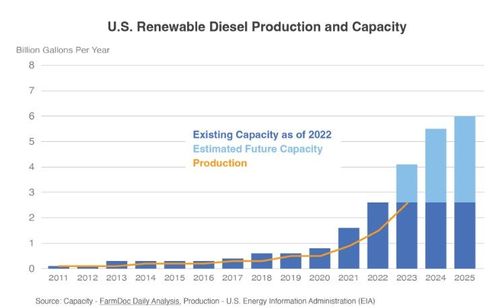
The USDA Foreign Agricultural Service on June 11 published a report discussing how the recent boom in U.S. renewable diesel production has caused market-altering shifts to both foreign and domestic feedstock trade.
U.S. renewable diesel consumption has increased substantially in recent years, from approximately 250 million gallons in 2013 to just under 3 billion gallons in 2023. That growth has been driven largely by California’s Low Carbon Fuel Standard, with the report noting that biomass-based diesel accounts for approximately 60% of the California diesel pool while the rest of the U.S. remains in the low single digits.
The USDA’s report cites several market factors that have aided in the rapid expansion of U.S. renewable diesel production in recent years, including the ability to repurpose oil refineries to produce the fuel. Production of renewable diesel has expanded at the expense of biodiesel production, as the two fuels are made from the same feedstocks. The report notes that biodiesel production has gradually trended down since its peak in 2018, with renewable diesel capacity surpassing that of biodiesel in 2022 and renewable diesel production exceeding biodiesel production the following year.
The growth in renewable diesel capacity and production has bolstered demand for feedstocks, driving explosive growth in U.S. imports of vegetable oils and animal fats, according to the report. The USDA offers several examples, such as the U.S. EPA’s 2022 Renewable Fuel Standard pathway approval that allowed canola oil to become an eligible feedstock for renewable diesel production, which supported record high imports of canola oil. While much of the canola oil imported into the U.S. was used to produce fuel, the USDA also notes increased canola oil imports also helped backfill displaced soybean oil in other markets, such as food production, which had been impacted by increased demand for soybean oil for use as biofuel feedstock. According to the USDA, the spike in canola oil demand is unlikely to be short-term, as U.S. canola oil imports, food use consumption and industrial consumption are all expected to set records for the third consecutive year in 2024-’25. Much of that canola oil comes from Canada. Approximately 91% of Canada’s canola oil exports were destined for the U.S. last year, up from 50-60% in previous years. The USDA notes that canola oil supplies should remain robust, as Canada has announced plans to expand crush capacities over the next several years.
The imports of several other renewable diesel feedstocks have also spiked in recent years. According to the USDA, the import values of all animal fats and vegetable oils more than doubled between 2022 and 2023, with used cooking oil (UCO) imports more than tripling in 2023 on higher imports from China.
A changing tax credit structure in the U.S. starting in January 2025 is expected to drive additional growth in renewable diesel feedstock imports. The USDA explains that the current blenders tax credit for biobased diesel expires and will be replaced with a clean fuels production tax credit. The change from a blender’s credit to a producer’s credit means that the tax incentive will apply only to biobased diesel produced in the U.S. As a result, demand for biofuel imports is expected to drop substantially. Increased demand for U.S.-produced fuels is expected to drive even higher imports of fats and oils for use as biofuel feedstock, particularly lower carbon-intensity feedstocks such as tallow, UCO and corn oil.
The USDA points out that the boom in renewable diesel production has not only impacted import markets, U.S. export markets have experienced changes as well. U.S. soybean exports have trended down in recent years and the U.S. share of global soybean trade is expected to remain below the 5-year average in 2024-’25.
The domestic soybean crush, however, is expected to set a record for the fourth consecutive year in 2024-’25 as a direct result of expanding U.S. renewable diesel production. Robust growth in U.S. demand for soybean oil has increased soybean meal supplies, leading to record soybean meal exports in 2022-’23, according to the USDA. Increased supplies and higher exports are expected to continue, with 2024-’25 soybean meal exports expected to set a record for the third consecutive year.